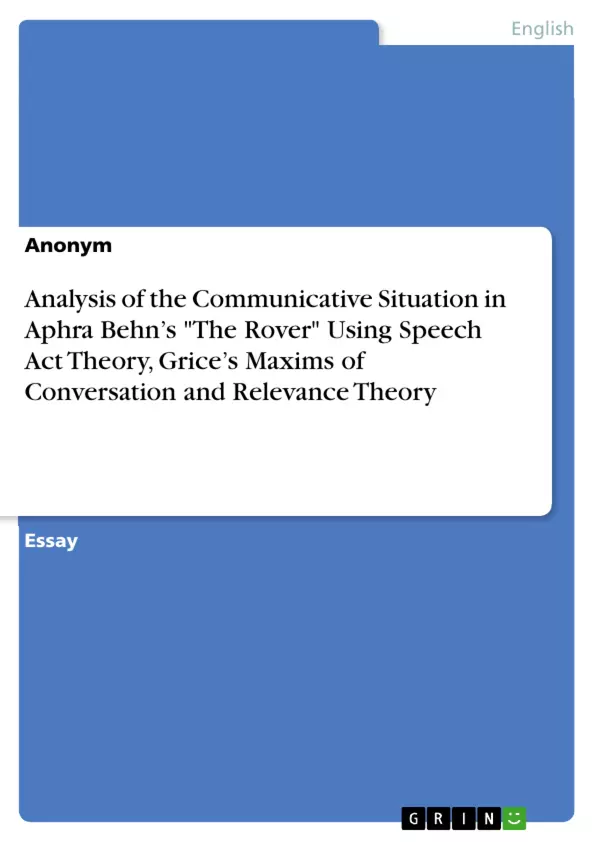This essay argues that Aphra Behn's "The Rover" is first and foremost a play about language and communication, and the transformative power of language. Verbal communication in "The Rover" is the most powerful instrument in the game of seduction. It not only structures the social relations between the two sexes, but it gives structure to the whole play.
This essay applies Speech Act Theory, Grice’s Maxims of Conversation and parts of Relevance Theory from the linguistic field of Pragmatics to "The Rover" and will thus provide an analysis of the communicative situation in the play. The analysis will mainly focus on Willmore, Hellena and Angellica’s speech, but will take the other characters into consideration, too. I will show that the characters in the play have different philosophies of language. While Willmore considers and uses language as performative and transformative instrument, his female interlocutors consider speech as a means for conveying and knowing truth. These different philosophies, or understandings of the power of language, problematize communication in the play and explain why in one and the same conversation communication can be felicitous for one interlocutor and infelicitous for the speaker.
First, Austin’s Speech Act Theory will be applied, and a detailed differentiation between Willmore and his female interlocutors’ concepts of language will be provided. These observations will in a second step be supported by Grice’s Maxims of Cooperation and Sperber and Wilson’s Relevance Theory. I will then show what strategies the characters in "The Rover" develop to deal with Willmore’s philosophy of language. Finally, a number of questions which this analysis raises will be identified.
Table of Contents
- Introduction
- Language in The Rover: performative or constative? Application of Austin and Searle's Speech Act Theory to the play.
- Grice's Maxim's of Conversation, and Sperber and Wilson's Relevance Theory applied to The Rover.
- The characters', especially the 'victims\" strategies in this unusual communicative context...
- Open questions........
- Conclusion
Objectives and Key Themes
This essay explores the role of language and communication in Aphra Behn's play The Rover, arguing that it is a play primarily about language and its transformative power. The essay analyzes the communication dynamics in the play, specifically focusing on the characters of Willmore, Hellena, and Angellica. It examines how verbal communication shapes social relations, especially between genders, and how it structures the play itself.
- The interplay between performative and constative language
- The power of seduction and manipulation through language
- The different philosophies of language held by characters
- The impact of speech acts, especially promises and vows, on relationships
- The effectiveness of communication when intention and interpretation diverge
Chapter Summaries
- Introduction: This chapter introduces the essay's main argument, focusing on the transformative power of language in The Rover. It highlights the use of Speech Act Theory, Grice's Maxims of Conversation, and Relevance Theory to analyze the communicative situation within the play, with a particular focus on the characters of Willmore, Hellena, and Angellica.
- Language in The Rover: performative or constative? Application of Austin and Searle's Speech Act Theory to the play.: This chapter explores the distinction between constative and performative language, drawing on Austin's work. It examines how Willmore uses language performatively to manipulate and seduce women, while his female interlocutors understand his speech as constative, seeking truth and meaning. The chapter also discusses Felman's analysis of communication in Molière's Don Juan, drawing parallels to The Rover.
Keywords
This essay focuses on the themes of language and communication, seduction, transformative power of speech, speech act theory, performativity, constativity, Grice's Maxims of Conversation, Relevance Theory, and the characters of Willmore, Hellena, and Angellica.
Frequently Asked Questions
How does "The Rover" use language as an instrument of power?
The essay argues that verbal communication is the primary tool in the game of seduction, structuring social relations and the play's overall progression.
What is the difference between performative and constative language in the play?
Characters like Willmore use language performatively to manipulate, while female characters like Hellena often view speech as a constative means of conveying truth.
How are Grice’s Maxims of Conversation applied to the text?
The analysis uses Grice’s maxims to explain how characters cooperate or intentionally fail to cooperate in communication to achieve their goals.
What linguistic theories are used in this analysis?
The essay applies Speech Act Theory (Austin/Searle), Grice’s Maxims, and Relevance Theory (Sperber and Wilson) from the field of Pragmatics.
Why does communication often fail between the characters?
Communication is often infelicitous because the interlocutors hold different "philosophies of language," leading to divergent interpretations of the same conversation.
- Quote paper
- Anonym (Author), 2014, Analysis of the Communicative Situation in Aphra Behn’s "The Rover" Using Speech Act Theory, Grice’s Maxims of Conversation and Relevance Theory, Munich, GRIN Verlag, https://www.grin.com/document/336374



